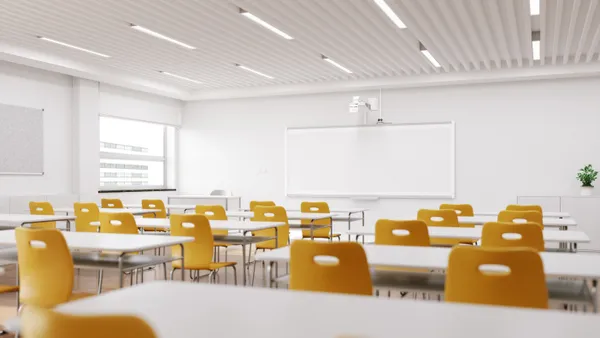Dive Brief:
- According to a recent study from New American Economy, the number of bilingual job postings tripled between 2010-2015, making a strong case for the importance of bilingual education in P-16 schools. This was the topic of an education roundtable convened by Rosetta Stone and presented in association with Lead with Languages Wednesday in Arlington.
- Dual language programs are growing in popularity in the K-12 sector, said a panel of experts from K-12 and higher ed, but a lack of qualified language teachers is still a struggle.
- University of Pennsylvania's Kenric Tsethlikai said language learning is not valued in the overall university academic picture, and "structurally, there's a lot of changes that need to be made" to see bilingual education be successful in higher ed.
Dive Insight:
"In the old days, we taught language in this country as an academic pursuit, and there was no thought that students would" have to use the language, said American Council on the Teaching of Foreign Languages Executive Director Martha Abbott. But this is no longer the case. NAE's Hsi-Ling Liao said it is not only a growing global focus in business that necessitates bilingual education to adequately support the workforce, but the reality that the increasing diversity in the country means there is a greater need for customer-facing positions domestically that serve individuals in multiple languages.
Teacher shortages are a problem across the K-12 sector, but in language education, the issue is even more pronounced. Abbott said the use of hybrid language courses, particularly in rural areas, has taken off, embracing a blended learning approach to bring students language instruction via Skype and other media. Boone County, KY, was cited for its district-wide approach to global competency, and panelists pointed out the level of commitment to bilingual education must come from the district level to be successful.
Kenric Tsethlikai serves as managing director of the Lauder Institute at the University of Pennsylvania's Wharton School of Business. He posited bilingual education doesn't just teach language skills, but helps students develop self-awareness and cognitive skills as well as the cultural competencies necessary for success in the real world. However, he argued language learning is sort of an afterthought in the higher ed enterprise, and suggested a number of adjustments that need to take place on campus. For one, he said, it should be emphasized at the provost level to make sure it is viewed as a priority. Second, he said, language professors should be grouped with professors of other disciplines to collaborate cross-curricularly to ensure language learning and cultural competency are integrated across subjects.












